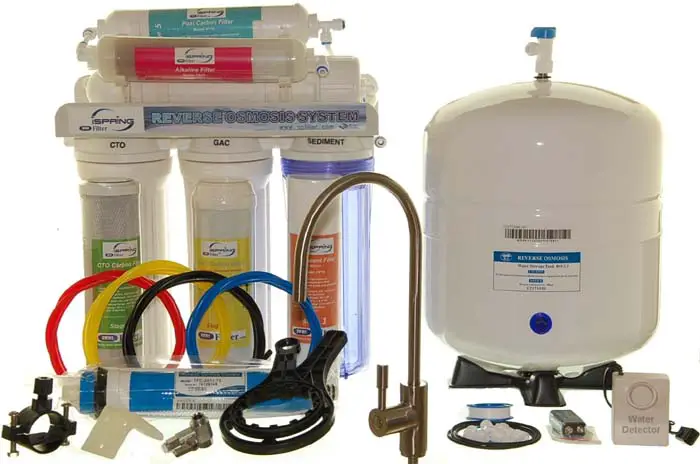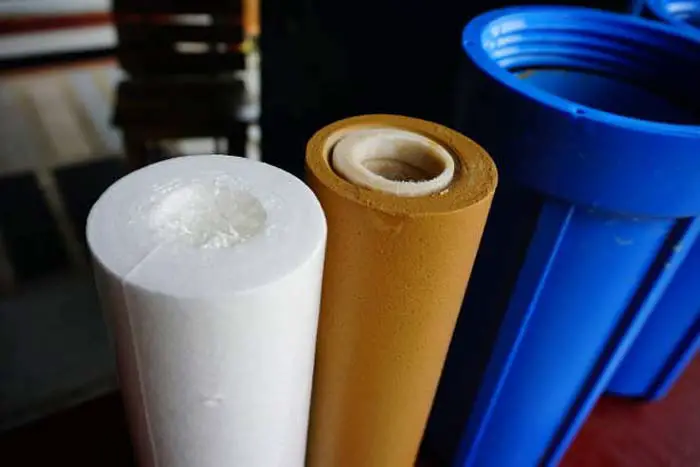What is in the water you’re drinking? You and your family could become ill by drinking even the best tap water, even if it is treated. It can be costly to purchase bottled water. It is also not the most environmentally friendly option. By using an RO system, you can ensure the safety and cleanliness of your water supply.
Water purifiers are widely used these days. Deciding on several water-purifying methods might be overwhelming. Reverse osmosis water filters are the most popular of these devices. This water purification procedure uses porous membranes to remove impurities such as ions, unwanted molecules, and pathogens.
In what way does the term “reverse osmosis” refer?
This procedure is becoming more and more popular to purify drinking water. Simply put, bigger molecules are separated from the solution as it goes through a filter, which varies from product to product. The filter’s pressure helps move the water and remove contaminants as it goes through it. Water is fresh and pure as it emerges from the other side. It will be ideal for home use as well as drinking. Typically, the water goes through multiple barriers to remove contaminants and particles before being used at home.
What can a RO water system remove?
This method can purify water by removing a variety of impurities. Magnesium, potassium, sodium, and calcium are more common pollutants. You can get rid of many toxins from plain water. The good news is that these machines have a 99 percent efficiency rating.
However, these units have their own set of restrictions. You can’t do so with them if you want to soften your water or remove chlorine. This system has carbon filters that help remove a number of contaminants, such as pesticides, chlorine byproducts, and pharmaceuticals.
Reverse Osmosis Water Filter Features to Look for.
Water waste
Reverse osmosis filters don’t produce drinking water from every drop of water that passes through them. Most water goes to waste, with just about half of it going through filtration. If you’re treating a lot of water per day, you’ll want to stay away from units with a waste percentage of at least 75%. A tank that produces 75% waste will have a filtered water-to-waste ratio of 1:3 if this unit is measured in ratio form.
Size of container
Most reverse osmosis water filters include tanks that store water instead of purifying it on demand. This is because the process takes a long time. If you are doing reverse osmosis on all the water or your family uses a lot of filtered water, you’ll want a tank that can hold enough water.
Filter speed
Refilling most reverse osmosis filters quickly is possible, although this isn’t always possible. If you’re looking to filter tap water, search for a system that can handle at least 50 gallons of water daily. If you only use it for drinking water, you can use a smaller tank and a slower refill rate.
Filtering stages
The finest reverse osmosis water filters employ a series of filters referred to as stages. This is because no one filter can remove all pollutants. In general, it is thought that water purification systems should have no more than four stages.
The filtration phases have a carbon filter that gets rid of sediments; a post-filter to get rid of the taste and smell of the water; a reverse osmosis membrane that gets rid of dissolved elements from your water; and a filter that eliminates dangerous bacteria, microbes, and pollutants.
Extra filters get rid of too many nitrates, lead, iron, salt, and smaller 1-micron particles. Reintroducing vital minerals, like calcium, back into the water lost in prior filtrations using larger six- and seven-stage systems is possible.
Purification of drinking water by reverse osmosis (RO) has several advantages.

Worldwide, reverse osmosis water filters are a safe and effective method of purifying water. RO water filters are the most efficient method for removing heavy metals and chemicals. For example, fluoride, mercury, iron, arsenic, and lead. In addition to preventing the spread of diseases through water. Thanks to its powerful filtering capability, you’ll get sweet, soft water you can drink confidently. You can install this system as a point-of-entry system. This will help filter the water entering the house, directly at your kitchen faucet or even under your kitchen sink.
The following are four compelling reasons to consider when purchasing an RO drinking water filter:
The positive effects on the body’s health are worthwhile.
In terms of water filtration, this system is the most efficient method. You can get rid of 99 percent of pollutants from your drinking water. Charcoal filters alone are ineffective in removing some impurities. This method is significantly more successful. Anyone with a weakened immune system would appreciate this product’s excellent efficiency. It’s something that we could all use. Clean water is essential to human survival. For instance, bacteria are poisonous to the human body. A reverse osmosis water filter will ensure the safety of your drinking water.
Removes minerals
Water softeners can’t be replaced entirely with a water filter. Most people use reverse osmosis water filters in their homes to make water safe to drink, not clean it for bathing.
You can use reverse osmosis to remove the minerals that cause hard water. Scale and other problems are a result of using hard water.
For those who can’t afford to upgrade their water system simultaneously, a reverse osmosis system can protect their kitchen faucet while saving up for a water softener.
Food and drink that tastes better
In addition to iron and other chemicals, water hardness also affects flavor. You can improve the water’s flavor using a reverse osmosis water filter. Clean drinking water is always available with an RO water filter, which you can connect straight to your tap. Cooking using filtered tap water after filtration using this unit often results in better-tasting food for most people. Bacteria are killed when water is boiled, but other impurities remain. This has an impact on the flavor of food.
Filtrates various types of heavy metals
You may not want to drink your tap water on a regular basis because it may contain heavy metals. Nitrides, nitrates, and pesticides are among the heavy metals. The health effects of ingesting these heavy metals are serious. To be more precise, they have the potential to harm your nervous system as well as your kidneys and liver.
If you want to get rid of heavy metals in your drinking water, buying a high-quality reverse osmosis water filter system is best. You can use these devices to get rid of iron, mercury, chlorine, lead, arsenic, and fluoride from tap water.
Money saver
Reverse osmosis water filters are an excellent long-term investment. This is because they reduce your consumption of treated water. Although initially appears to be a pricey option, it will always be less expensive than bottled water. You could save a lot of money per year depending on how much water you use.
You no longer need bottled water
You might think bottled water is superior to tap water, but this is not always the case. Some bottled water has been processed minimally, while others may have gone through reverse osmosis filtration. It is possible to stop going to the store for bottled water and make superior quality water at home with a reverse osmosis device. The less single-use plastic you use, the less likely you are to have an impact on the environment.
Very effective
In addition, the reverse osmosis water filter can give an additional layer of protection. This is unlike other methods of filtering water, which are more susceptible to contamination. In addition, these methods can remove even the smallest amounts of chemical pollutants. This level of filtration may not be available in other units.
Reverse osmosis water filters and UV filtration units work well together. They help to remove these toxins from your drinking water.
Low-cost maintenance
Reverse osmosis systems are simple to maintain. They require only the occasional replacement of filters. A water filter system for your refrigerator, countertop, or under-sink sink is very low maintenance. Knowing the replacement filter types and intervals in advance is best to avoid unpleasant surprises.
Environmentally friendly
Even if you are aware of the harm plastic bottles do to the environment, you, like most of the population, have undoubtedly purchased bottled water anyhow. You can cut down on the amount of bottled water you buy by using a reverse osmosis water filter to get healthy and safe water right from the tap.
Conclusion
RO technology can produce fresh water from seawater in water-scarce regions of the world. Industry settings can also use this method to clean contaminated wastewater. Sometimes it’s a viable option for producing potable water in the home.
In addition to the peace of mind that comes with knowing that your business or home has high-quality drinking water, an RO water filter is a popular choice for customers looking to reduce their reliance on bottled water.

